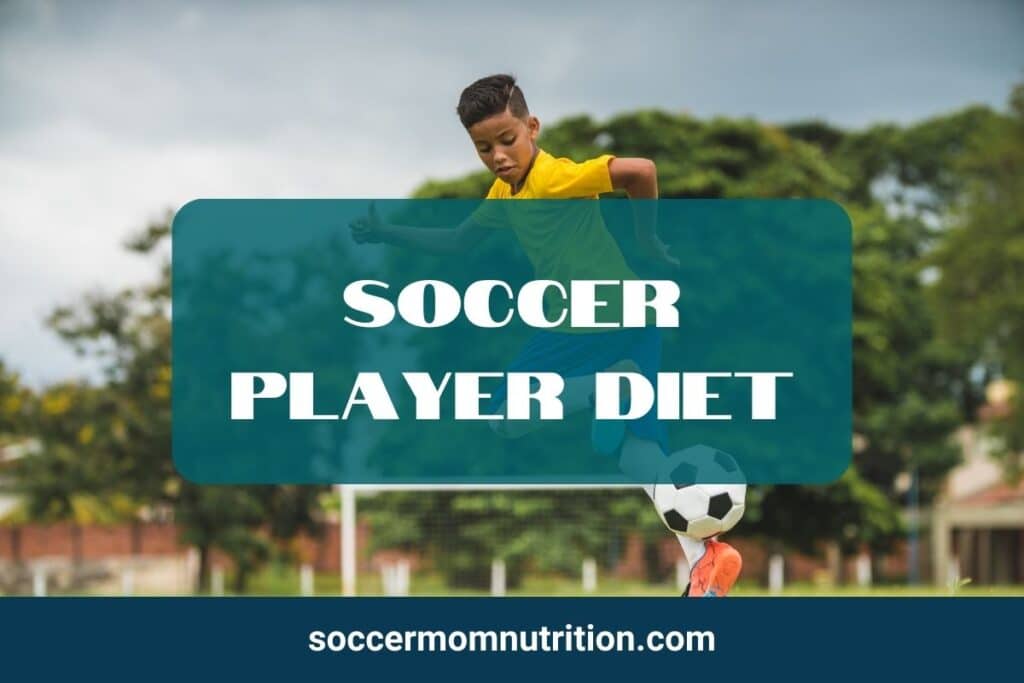
If you are a soccer player, you know that your soccer player diet is crucial for your performance on the field. What you eat and drink can affect your energy levels, your speed, your strength and your recovery.
But what is the best soccer player diet? How can you optimize your nutrition to play soccer at your best?
In this post, we will share with you some simple and practical tips on how soccer players can eat like a pro.
We will cover the basics of a balanced and nutritious soccer player diet, and we will also give you some examples of what to eat before, during and after a soccer game or training sessions.
Let’s get started!

A soccer player diet is a balanced and nutritious way of eating that provides your body with all the macronutrients and micronutrients it needs to play soccer at your best.
Macronutrients are the big nutrients that give you energy and help you build muscles. They are carbohydrates, protein and fat.
Micronutrients are the small nutrients that help your body function properly and prevent diseases. They are vitamins, minerals, antioxidants and phytochemicals.
Carbohydrates are your main source of fuel for soccer. They provide energy for high-intensity activities such as sprints, jumps and shots.
Carbohydrates are found in foods like grains, fruits, vegetables, beans and dairy products.
Protein is your building block for muscles. It helps you repair, grow and maintain your muscles after exercise. It also helps you feel full and satisfied.
You should try to eat lean protein at every meal to help your muscles recover from the hard work they do on the field.
Protein is found in foods like meat, fish, eggs, nuts, seeds, dairy, soy and plant based products.
Soccer players should consume about 1.4-1.7 grams of protein per kilogram of body weight per day to support muscle recovery and adaptation to training. (1)
This is your backup source of fuel for soccer. It provides energy for endurance and low-intensity activities such as jogging, walking and resting.
Fat is found in foods like olive oil, olives, nuts, seeds, avocado, fish and animal products.
Soccer players should eat about 20-35% of their total energy intake from fat, with a preference for unsaturated fats over saturated fats.
The amount and type of carbohydrates you need to eat depends on your age, weight, height, gender, activity level and sports nutrition goals.
A general rule of thumb is to eat about 5-7 grams of carbohydrate per kilogram of body weight per day to meet your energy needs for playing soccer. (2)
For example, if you weigh 70 kilograms, you need to eat about 350 to 490 grams of carbohydrates per day.
However, this is just an estimate. You may need more or fewer carbohydrates depending on your individual needs and activity level. For hard intensity or game day activity, you may need closer to 8-10 grams/kg body weight.
You should also adjust your carbohydrate intake according to your training schedule and match day. By working with a sports dietitian you can fine tune your soccer player diet to meet your specific energy needs.
Also by following the performance plate method you can better plan your soccer player diet to meet your energy needs based on your game, practice and rest day schedules.
The type of carbohydrates you eat is also important. You should aim to eat mostly complex carbohydrates that are rich in fiber, vitamins, minerals and antioxidants, especially when you have time to digest your meal.
These include whole grains, fresh fruits, dried fruits, vegetables, beans and legumes. These carbohydrates provide a steady and sustained release of energy and help you feel full longer.
Some examples of good sources of complex carbohydrates for soccer players are:
When you are closer to game time, at halftime and right after a game choose simple carbohydrates that are low in fiber and so that you can top off and quickly replenish your energy stores. (3)
These include pretzels, applesauce, watermelon, granola bars, grapes and sports drinks. See more ideas in our posts on pre game snacks, halftime snacks and after game snacks.
The ratio of carbohydrates, protein, and fat in your diet can also affect your performance. A good balance for most soccer players is:
For example, if you eat 2400 calories per day, you should aim for:
However, this is not a strict rule. You can experiment with different ratios and see what works best for you. Also consider working with a sports nutritionist (sports dietitian) to fine tune your soccer nutrition plan.
Before a soccer game or practice, you want to eat a meal or snack that provides you with enough carbohydrates to fuel your muscles and brain, and enough protein to prevent muscle breakdown.
You also want to avoid foods that are high in fat, fiber or spices, as they can cause digestive discomfort or slow down your absorption of nutrients.
You should aim to eat your pre-game or pre-practice meal or snack about 3-4 hours before the start of the activity, and have a small top-off snack about 1 hour before if needed.
During a soccer game or practice, you want to maintain your hydration and energy levels by drinking fluids and eating carbohydrates.
You also want to avoid eating anything that is solid, heavy or hard to digest, as it can interfere with your performance or cause stomach upset.
Some examples of good during-game or during-practice drinks or snacks are:
You should aim to drink about 4-8 ounces of fluid every 15-20 minutes during the activity, and have a small carbohydrate snack every 30-60 minutes if needed. You can calculate your sweat rate to create a dialed in hydration plan.
After a soccer game or practice, you want to eat a meal or snack that provides you with enough carbohydrates to replenish your muscle glycogen stores, enough protein to repair your muscle damage and enough fluid to rehydrate your body.
You also want to eat as soon as possible after the activity, preferably within 30 minutes, as this is when your muscles are most receptive to nutrients.
You should aim to eat about 1.2 grams of carbohydrates per kilogram of body weight and about 0.5 grams of protein per pound of body weight within 30 minutes after the activity, and have another similar meal or snack within 2 hours.
If you are looking for some healthy snacks that you can enjoy between meals or before bed. Focus on high fiber and nutrient rich snacks as much as possible.
Here are some ideas:
These snacks provide you with a good balance of carbohydrates, protein and fat, as well as vitamins, minerals and antioxidants. They also help you curb your hunger and cravings.
Eating like a pro soccer player is not complicated. It just requires some planning, preparation and knowledge.
By following these tips on what to eat before, during and after a soccer game or practice, you can optimize your nutrition and performance on the field. You can also enjoy some healthy snacks that will keep you satisfied and energized throughout the day.
Remember that nutrition is not one-size-fits-all. You may need to adjust your intake based on your age, weight, height, activity level, goals and preferences. You may also want to consult a registered dietitian or sports nutritionist for more personalized advice.
Don’t forget to share this post with your fellow soccer players who might benefit from it.
Join our mailing list and get our FREE Pre-Activity Fueling Guide.

Stephanie Magill, MS, RD, CD, FAND has over 22 years of experience in public health and nutrition. As a performance registered dietitian nutritionist, Stephanie specializes in sports nutrition and provides simple and actionable information so that athletes can be well fueled for high performance on and off the field. Stephanie has a Master’s Degree in Nutrition and is a Fellow of the Academy of Nutrition and Dietetics.
Stephanie Magill, MS, RD, CD, FAND has over 22 years of experience in public health and nutrition. As a performance registered dietitian nutritionist, Stephanie specializes in sports nutrition and provides simple and actionable information so that athletes can be well fueled for high performance on and off the field. Stephanie has a Master's Degree in Nutrition and is a Fellow of the Academy of Nutrition and Dietetics.